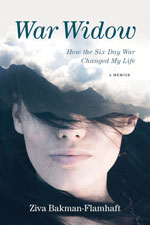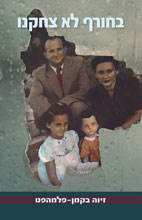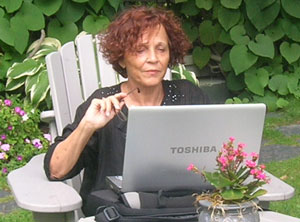
Published Works
War Widow:
How The Six Day War
Changed My Life
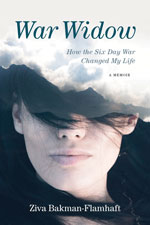 It is a story about a young girl born in Tel Aviv, Israel. My childhood years were marked by my mother’s severe recurrent depression. Like other children I blamed myself for my mother’s illness. Nothing original about that.
It is a story about a young girl born in Tel Aviv, Israel. My childhood years were marked by my mother’s severe recurrent depression. Like other children I blamed myself for my mother’s illness. Nothing original about that.
Like many more children around the world, I grew up in times of war.
Like other women, I fell madly in love with a man too popular among the opposite sex and got married young in spite of doubting my decision. Again, nothing unusual.
Like other women I suffered two miscarriages: a girl, who was too small to survive after twenty-two week of pregnancy, and a boy who lived for thirty-six hours after twenty-six weeks of pregnancy. Years later technology would have him survive. I went through a corrective procedure, and was "as good as new," planning another pregnancy.
AVAILABLE AT AMAZON:
 In the essay Widows of War, which was extracted from her memoir, Ziva Bakman-Flamhaft, an Israeli-American political scientist, remembers that dreaded knock at her door in June 1967, and talks poignantly about her losses, about Israel's chronic grief and what war costs women.
In the essay Widows of War, which was extracted from her memoir, Ziva Bakman-Flamhaft, an Israeli-American political scientist, remembers that dreaded knock at her door in June 1967, and talks poignantly about her losses, about Israel's chronic grief and what war costs women.
Excerpt:.
I have always understood Israel’s sense of isolation, but I felt it even more so this past summer, as I arrived in Israel from Poland, where I stopped on my way to the country of my birth to trace my paternal family’s roots, and to see, as a Jew, Birkenau and Auschwitz.
Nothing I have studied, read, seen, not Yad Vashem, not even my previous visit to Terezienstadt, prepared me for Birkenau and Auschwitz-for their enormity and for the efficiency with which the Nazis ran their death-oiled industry.
What shocked me the most was that not even the minutest detail was left to chance: not the place where the trains would first stop, where victims would initially be "selected," where they first undressed, where they were first disinfected and shaved, their hair used by the Nazis to manufacture fabric; not where they were disinfected for the second time, where their clothing was first fumigated, where their clothing was fumigated for the second time, where their clothing and belongings were collected, sorted and stored, where they would die by Zyclon B poisoning gas, where their corpses would be burned.
Essay available for purchase at: Lilith Magazine
 In the essay It May be the Chance of Your Life, which was extracted from her memoir, Ziva Bakman-Flamhaft talks about her decision to leave her native homeland and immigrate to the Unites State and the culture shock she faced upon her arrival to New York.
In the essay It May be the Chance of Your Life, which was extracted from her memoir, Ziva Bakman-Flamhaft talks about her decision to leave her native homeland and immigrate to the Unites State and the culture shock she faced upon her arrival to New York.
Excerpt:.
"How could you leave all this?" my daughter asked me as the two of us were walking with her daughter on Tel-Aviv’s waterfront esplanade, on a hot, humid afternoon in July 2006. She did not allude to only the sweet scent of the Mediterranean summer, emanating from the vapor of the powder-blue transparent sea, and the golden scorching sand under the bluest of skies. Neither was she alluding only to the energy emanating from the beach-goers, protected by rows of orderly placed persimmon-orange, hunter-green, or ultramarine-blue umbrellas, depending on the section in which the bathers set, the beach-front cafés, the hip shops, and restaurants.
Nor was she just referring to the neighborhood and home where I grew up - our visit there with her toddler daughter being the highlight of her trip--or the old and new sections of Tel-Aviv, designated in 2003 by UNESCO (United Nations Education, Cultural and Scientific Organization) as one of the world’s heritage sights--and the history and art museums, the theatres and concert halls, all telling the story of a vibrant society and a rich culture. For among the most precious things that I left behind when I decided to leave my country some thirty-seven years earlier, were the friendships and the deep love and warmth that are revealed to me by family and friends whenever I visit my place of birth, regardless of how often I do so.
Essay available for purchase at: The Feminist Press
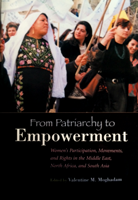 Other Publications:
Other Publications:
Book Review: The Israeli Palestinian Conflict by James Gelvin, Israeli Studies Forum, Vol. 23, Issue 1, 2008, pp. 127-129.
“Iron Breaks Too: Israeli and Palestinian Women Talk on War, Bereavement and Peace,” in Valentine M. Moghadam (ed.), Empowering Women: Participation, Rights, and Women’s Movements in the Middle East North Africa, and South Asia (Syracuse, NY: Syracuse University Press, 2007).
“From Sufferers to Activists: Israeli and Palestinian Women Talk on War, Bereavement
and Peace,” Women's Policy Journal of Harvard, May-June 2002.
Book review: Professionals Against Populism: The Peres Government and Democracy,
By Michael Keren (SUNY, 1995), Middle East Studies Association Bulletin, 32, 1998
pp. 119-120.
“Israel Raises Multiple Barriers to Peace,” Viewpoints, Newsday, December 10, 1997.
Israel on the Road to Peace: Accepting the Unacceptable (Boulder, Co.: Westview
Press, 1996).
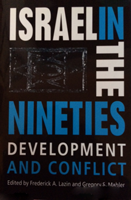 “Israel and the Arab-Israeli Peace process in the 1990s,” in Fred Lazin and Greg Mahler
“Israel and the Arab-Israeli Peace process in the 1990s,” in Fred Lazin and Greg Mahler
eds., Israel in the Nineties (University Press of Florida, 1996).
“The Issue of ‘Zionism and Racism’ in the United Nations.” Middle East Review (Vol.
XVIII, No. 30, Spring 1986) (Co-written with Ambassador S. M. Finger).

